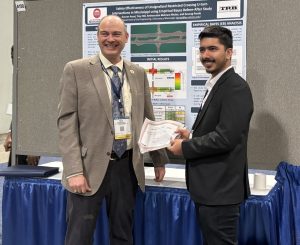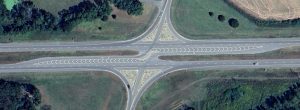Gaurav Aryal, a second-year Master’s student in the Department of Civil Engineering won the Best Poster Presentation award in geometric design at the Transportation Research Board (TRB) annual meeting. Held on January 8th in Washington, D.C., the international event draws more than 14,000 attendees from across the globe, including researchers, policymakers, and industry leaders.

(Submitted photo)
“I am very thankful to Dr. Amir Molan and the Department of Civil Engineering for the opportunity to present,” Aryal said. “Events like the TRB meeting provide invaluable insights into our field and help advance our academic and professional goals.”
Aryal’s poster, titled “Safety Effectiveness of Unsignalized Restricted Crossing U-Turn Intersections in Mississippi Using Empirical Bayes Before-After Study,” was selected as the Best Graduate Student Poster among 12 posters presented by graduate students from 11 universities in the United States and one from Brazil. The competition, organized by the TRB Standing Committee on Performance Effects of Geometric Design (AKD10) committee, was judged by experts in geometric design and safety, including leaders from the Federal Highway Administration (FHWA), state departments of transportation (DOTs), academic institutions, and consulting firms.
The research explores the safety performance of Restricted Crossing U-Turn (RCUT) intersections, also known as reduced conflict intersections (RCI), superstreets or J-turns, in Mississippi. RCUTs redirect left-turn and through movements from minor roads into right turns, followed by downstream U-turns to complete the maneuver. These designs are gaining popularity across the United States, with possibly over 1,000 implemented nationwide.
“In Mississippi, over 24% of fatal crashes occurring either at intersections or near intersections,” Aryal said. “Various studies have reported crash reductions with the RCUTs ranging from 20% to 70%, and there is very little research on the implementation of these intersections in Mississippi. This project focuses on safety evaluation and development of a design guide for these intersections. Mississippi has installed more than 20 RCUTs.”

(Submitted photo)
Aryal’s achievement also involved contributions from fellow graduate students Troy Hill and Stephen Osafo-Gyamfi, who serve as co-authors on the project. The team’s collaborative efforts underscore the value of interdisciplinary work in addressing critical transportation challenges.
Aryal, originally from Nepal, developed an interest in transportation safety due to the prevalence of traffic crashes in his home country. Now in his third semester pursuing a master’s degree in civil engineering, Aryal hopes to graduate in August and pursue a career in traffic and road safety, potentially with a state DOT or a consulting firm.
The TRB annual meeting is known for its high-profile speakers, including the U.S. Secretary of Transportation, who delivers a keynote address each year. Aryal’s recognition at such a significant event highlights the quality of research produced at the University of Mississippi’s School of Engineering and its impact on the broader transportation community.
Story by Kayla VonBurg-King, School of Engineering